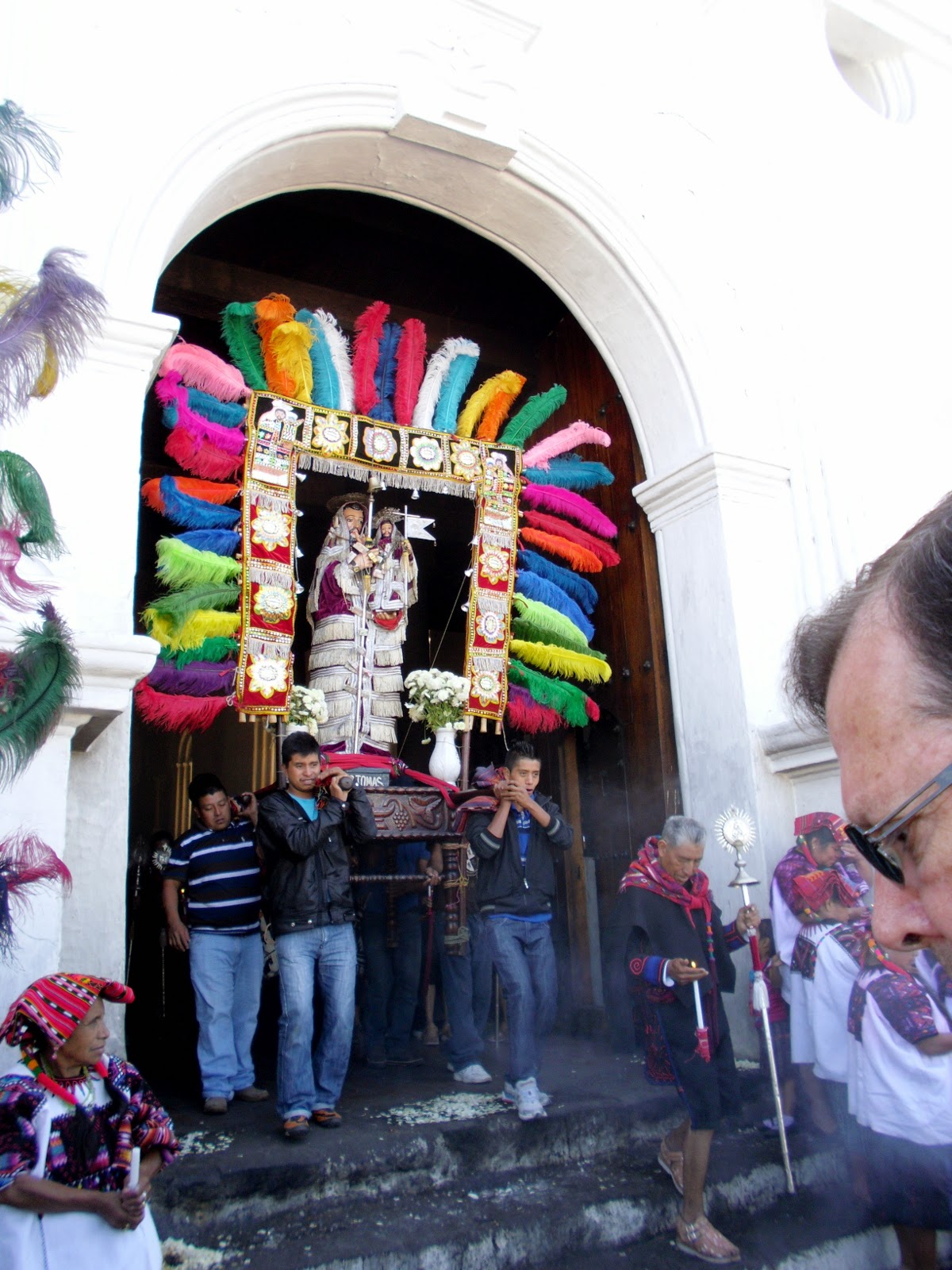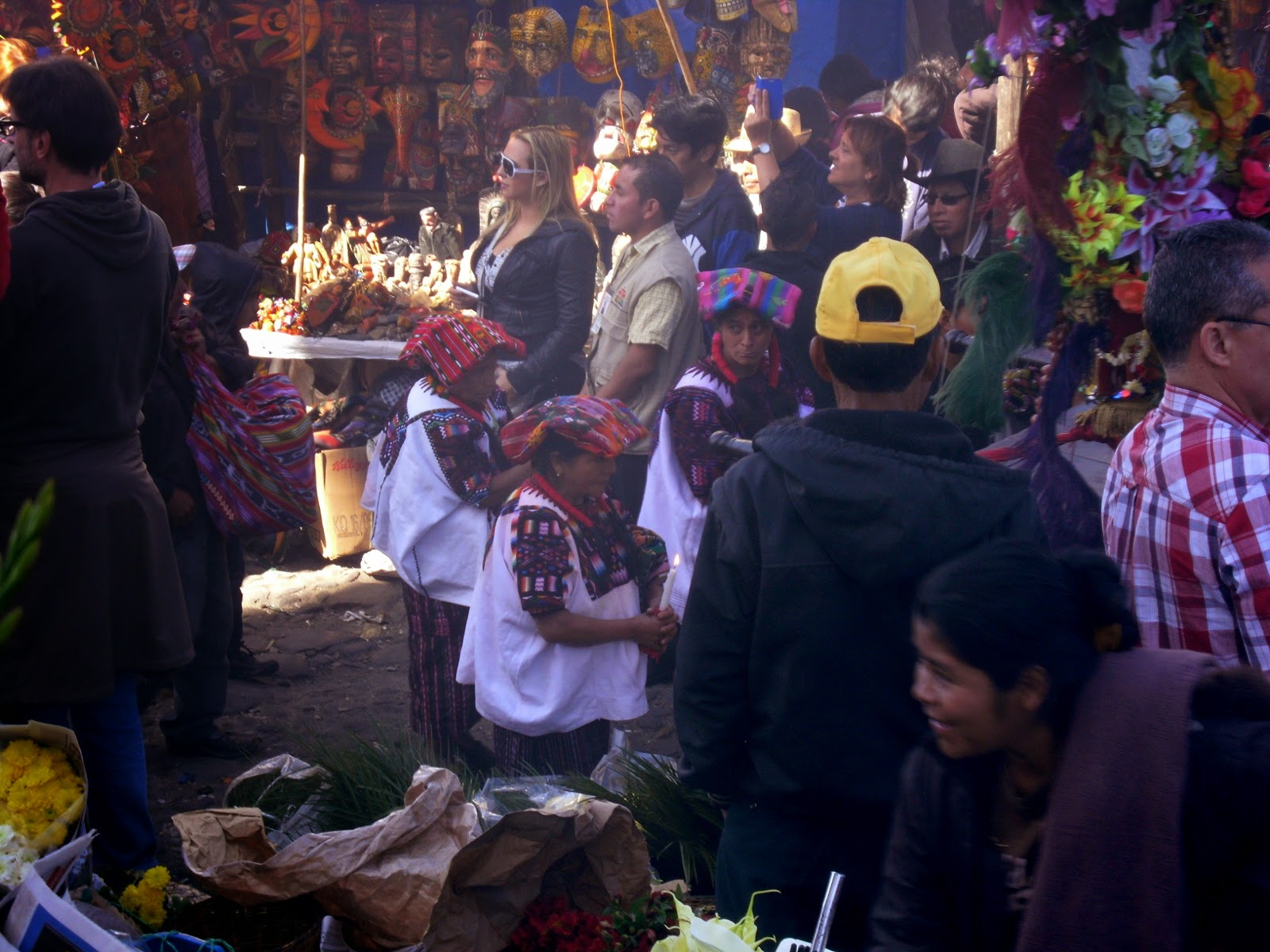We are back at the Camioneta terminal in Xela, and this time, we're quite happy (well, not happy, but it's still what we were hoping for) when someone screams into our faces "CHICHI?? CHICHIIII!!!" Yes, two to Chichi, please.
 |
| Around 98.000 of these diesel-guzzling monsters are roaring around in Guatemala. The old school buses from the States are imported, and, as I've heard, brought back to life with stronger engines to cope with the Guatematecan roads. |
The ajudante of this camioneta still posesses two fully functional hands, but does the same tricks as the one-handed guy from the last bus. Climbing out of the window and onto the roof during reckless driving.. we are getting used to it.
However, on this journey we hear why they are commonly called "chicken buses": One of our co-passengers stows three large cardboard crates with air holes on the overhead storage. All three boxes emit low cheeping noises. Whenever the bus takes a sharp corner and all chicks within the box are compressed in one corner due to the centrifugal forces, the noise rises to an excited crescendo of startled squeaking.. Okay, chicken bus all right.
In Chichicastenango, we arrive on Saturday afternoon. The Plaza Central of this little town is already occupied with lots of semi-permanent looking stalls, tents and buildings, that together form a sort of cave, in which a lot of comedores are housed.
 |
| Just a regular market on the day before M-Day. (Market Day is every Sunday in Chichi, and Wednesday as well, I think.) |
In the evening, the activity increases: More makeshift food stalls appear to feed all the countless people that arrive to set up more shops. We sit on the terrace of a restaurant at the edge of the Plaza Central, sit our beers, and watch the spectacle. It's quite fascinating to see how quickly the skilled tradesmen set up a frame of some poles, held together with just a bit of rope. Then they throw more strings over and around these racks, pull up a rain-resistent tarpaulin, and just a few minutes later they add the finishing touches to their shops.
On the next morning, Sunday, the market is open. And yes, it's overwhelming. There's an endless stream of people, shouting vendors of handbags, tightlipped tourists from Guatemala, little kids running around selling bracelets, indigenous ladies praising the quality of their food, awestruck or foolish tourists from abroad, fruit-juice sellers, clothes merchants.
And because, at some places, there still might be a few square-centimeters of open space, the church doors fly open, and a procession spills out onto the crowded square. Not just people, but also people carrying those large floats with the statues of some saints on it..
 |
| Flower in front of the church, and the tent-town that is the market in front of that. |
 |
| If you're not careful, you might end up buying a LOT of stuff. That you don't need. But it will put a smile (or an evil chuckle) on the vendor's face. |
 |
| Yeah, we want through here! What? No space? No worries, it will work out somehow.. |
 |
| Lots of different worlds mingling on the Chichicastenango market. |
I already mentioned it, but what is it that Saints seem to like most? Yes of course, fireworks! So in the middle of this insane crowd, at least three guys set down steel tubes with welded-on bases, load these mortars (yes, that's what they are) with some self-rolled packets of gunpowder, and ignite the fuse.
 |
| This is Mr. Happy Bomberman, with his cheerful bag of celebratory self-made fireworks, assisted by Mortar-Carrying Boy, and Guy with a Hat and a Match. When they are reloading their contraption, Old Drummer Guy can make some in-between noise. |
Two seconds later I'm happy that I still have my eyebrows, but really, really want to get further away from these maniacs. We manage to escape, and apparently no-one gets ripped apart on this day. I wonder why.
 |
| At this stall they are selling furniture. The shop where they sold their own old grannies is right next to this one. |
 |
| Graveyards sure look a lot more cheerful in Central America. |
Our next stop is, once more Lago Atitlan, but this time with a mission: Spanish course!









Keine Kommentare:
Kommentar veröffentlichen